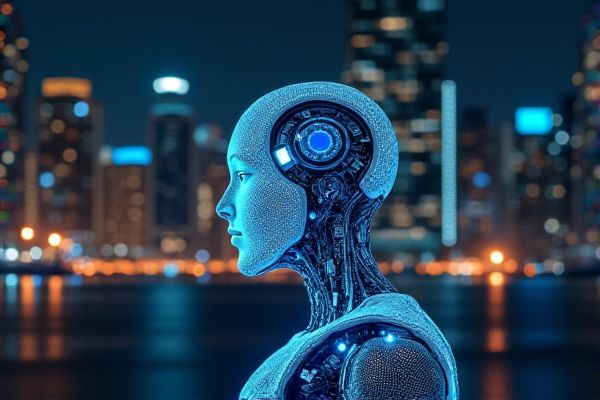
AI enhances guest experiences in the hospitality industry by enabling personalized services, such as tailored recommendations and customized itineraries. Intelligent chatbots streamline customer inquiries and reservations, providing 24/7 operational support and freeing staff to focus on in-person guest services. Predictive analytics allow hotels to forecast demand accurately, optimizing pricing strategies and improving inventory management. Through automation of routine tasks, AI increases efficiency in operations, ultimately leading to reduced operational costs and improved guest satisfaction.
AI usage in hospitality industry
Personalized Guest Experience
AI can enhance personalized guest experiences in the hospitality industry by analyzing customer preferences and behavior. Hotels may use AI-powered systems to recommend tailored services or amenities, such as personalized dining options based on previous visits. This technology can also streamline operations, potentially increasing efficiency and guest satisfaction. For instance, platforms like Guestline can integrate AI to optimize room assignments based on guest preferences.
Automated Customer Service
AI usage in the hospitality industry, particularly in automated customer service, offers significant advantages. For example, chatbots can handle common inquiries, leading to faster response times and improved customer satisfaction. This technology enables hotels to allocate human resources more effectively, focusing on complex guest needs. The potential for increased operational efficiency and enhanced guest experiences is substantial.
Smart Room Controls
Smart room controls in the hospitality industry can enhance guest experiences by allowing personalized settings for lighting, temperature, and entertainment. This technology can optimize energy consumption, potentially reducing operational costs for hotels like Marriott or Hilton. Implementing AI-driven systems may provide a competitive edge, attracting tech-savvy clientele. The possibility of integrating smart room controls with mobile apps offers convenience and additional features for guests.
Predictive Maintenance
AI usage in the hospitality industry offers the possibility of enhancing operational efficiency through predictive maintenance. For instance, hotels can utilize AI algorithms to predict equipment failures before they occur, minimizing downtime and repair costs. This approach can lead to a better guest experience as amenities remain in optimal working condition. By analyzing data patterns, institutions like Marriott can improve their service reliability and reduce unexpected disruptions.
Dynamic Pricing Strategies
AI can enhance dynamic pricing strategies in the hospitality industry by analyzing real-time data to optimize room rates. This approach allows hotels to adjust prices based on demand fluctuations, competitor pricing, and customer behavior. For example, a hotel may use AI algorithms to increase rates during peak tourist seasons while offering discounts during off-peak times to attract more guests. The potential for improved occupancy rates and revenue generation makes this strategy advantageous for establishments like international hotel chains.
Virtual Concierge Services
Virtual concierge services powered by AI present a significant advantage in the hospitality industry. These systems can efficiently handle guest inquiries and provide personalized recommendations, enhancing the overall guest experience. For example, a hotel may implement a virtual concierge to assist with dining reservations or local attractions, streamlining operations. This technology could lead to increased guest satisfaction and loyalty, ultimately benefiting the establishment's reputation.
Data-Driven Marketing
AI usage in the hospitality industry can enhance customer experiences by providing personalized recommendations. Data-driven marketing allows hotels and restaurants to analyze customer preferences, leading to tailored promotions that may increase bookings. For instance, a hotel chain could use AI to predict peak booking times and adjust pricing strategies accordingly. The integration of AI and data analytics could also improve operational efficiency, leading to potential cost savings and increased profitability.
Efficient Staffing Management
AI can enhance staffing management in the hospitality industry by optimizing employee schedules based on demand forecasts. For instance, hotels like Marriott utilize AI-driven analytics to predict busy periods and adjust workforce levels accordingly. This capability not only ensures adequate staffing but also reduces labor costs, leading to increased operational efficiency. As a result, establishments can improve guest experiences while maintaining a balanced budget.
Enhanced Security Systems
AI usage in the hospitality industry can lead to improved guest experiences through personalized services. Enhanced security systems powered by AI can monitor surveillance footage in real-time, reducing response times to incidents. Hotels utilizing AI for managing bookings and customer inquiries can also increase operational efficiency. Implementing these technologies may provide a competitive edge in attracting more guests and enhancing safety.
Real-Time Feedback Analytics
Real-time feedback analytics in the hospitality industry can enhance customer experiences by allowing establishments to promptly address issues. For example, a hotel chain can utilize this data to improve services based on guest reviews and preferences. The implementation of AI tools may lead to more personalized marketing strategies, increasing guest satisfaction and loyalty. This approach not only captures insights but also offers a competitive edge in attracting new customers.
 techknowy.com
techknowy.com